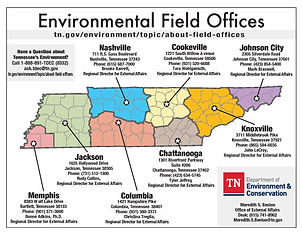TDEC has eight field offices spread through the state. These offices are the starting point for most environmental complaints.
To make TDEC aware of any concerns you may have, you must file a complaint with them informing them of who you are, what your concern is, and where it is.
As per the Clean Water Act, all dischargers of pollutants into the nation's waters must have a permit to do so. The public has a chance to influence the availability or terms of a permit an entity receives.
TDEC Field Offices
The Tennessee Department of Environment and Conservation has field offices in Chattanooga, Columbia, Cookeville, Jackson, Johnson City, Knoxville, Memphis, and Nashville. Each office has a Regional Director of External Affairs, administrative staff, and technical staff that work under each of TDEC's Divisions, such as Geology, Air, or Water Resources. Each office will also contain papers regarding permits within their area.
You can see all of the Field Offices here.

Filing Complaints with TDEC
In accordance with Section 118(a) of the Tennessee Water Quality Control Act, citizens can file complaints with TDEC regarding alleged noncompliance with our water quality laws. The Act requires TDEC to respond to these complaints within 90 days.
TCWN regularly files 118(a) complaints to draw TDEC’s attention to a variety of permit violations and encourages private citizens to do so as well.
You may submit a 118(a) complaint to your local TDEC field office.
TDEC also has a simple complaint form online in which you may attach photographs or videos, found here. Note that though it is called a question form, it is also used to send in complaints.
Complaint Writing Tips
-
Include your name and contact information.
-
Mention the specific address/location where the water pollution is happening.
-
Include photos and dates, if possible.
Click here to see an example of a TWCN 118(a):
The Permitting Process - How Tennesseans can get Involved
The Clean Water Act requires all facilities discharging pollutants into our streams obtain a permit. This permitting program is called the National Pollution Discharge Elimination System (NPDES). The Tennessee Department of Environment and Conservation and the Army Corps of Engineers are responsible for issuing permits for activities that may physically impacts our waterbodies. TDEC issues ARAPs/401 certifications and the Corps issues 404 permits. While your city and county officials are responsible for some portion of the enforcement of these rules and local ordinances, the state and federal governments issue permits.
It is simplest to think of NPDES permits as those which control the chemical impacts to streams and 404 certifications or ARAPs as those permitting physical impacts to our streams. There are several types of permits within these categories. Learn more about specific permit types.
Public Input
You can influence permit conditions by commenting on the permit during its minimum 30-day public notice period. It is helpful to know what activities are planned or are happening in and around your community, espeically when it may impact your drinking water source.
Check out all NPDES, ARAPs, and mining permits on public notice. You can also see a full list of pending and active permits through TDEC’s permit dataviewer.
TCWN Comments
TCWN comments on many permits per month. Some recent permit comments include the Harriman STP, the Pigeon Forge STP, the Lick Creek Valley STP, and an ARAP in Hamilton County.
Permit Types in Tennessee
-
ARAP (§401): Persons who wish to make an alteration to a stream, river, lake or wetland must first obtain a water quality permit. Physical alterations to properties of waters of the state requires an Aquatic Resource Alteration Permit (ARAP) or a §401 Water Quality Certification.
-
NPDES: Persons discharging pollutants directly from point sources into surface waters of the state must obtain an NPDES discharge permit from the Tennessee Division of Water Resources. Direct dischargers include industrial and commercial wastewater, industrial stormwater, and municipal wastewater discharges. Mining facilities and Class I Concentrated Animal Feeding Operations (CAFOs) also require NPDES discharge permits.


